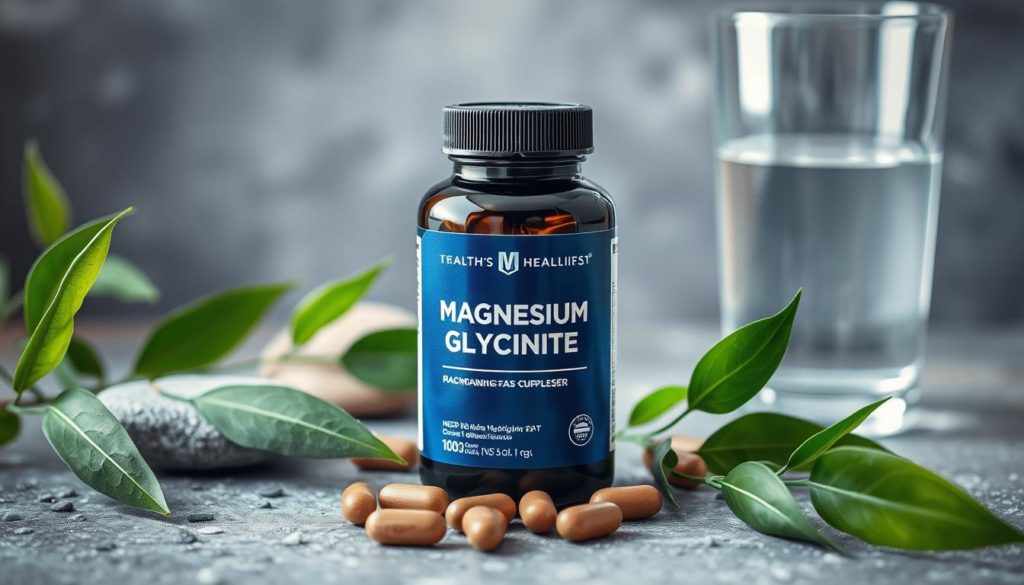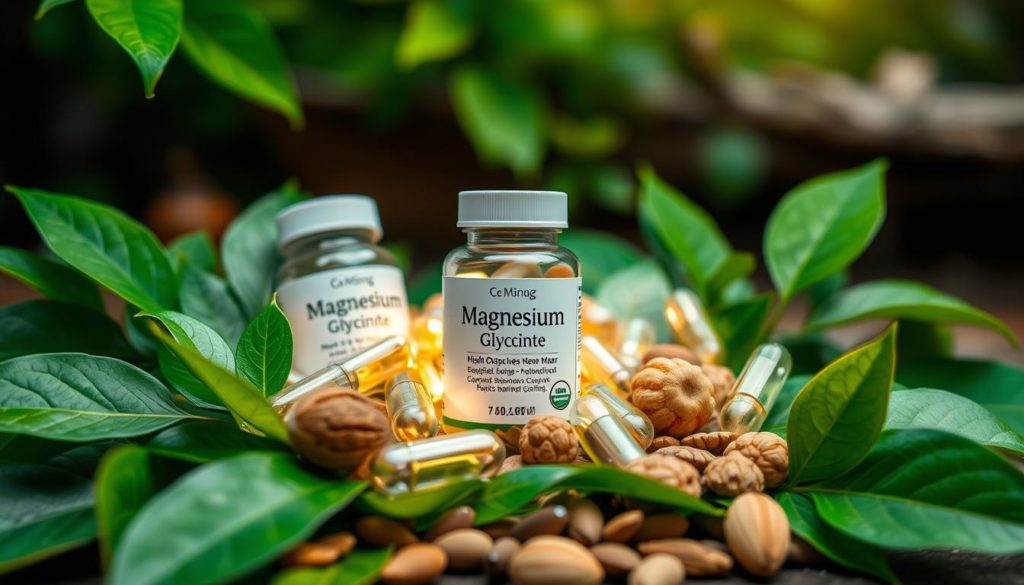Did you know up to 68% of Americans might not get enough magnesium? This fact points to a common but ignored health problem. Enter Magnesium Glycinate. It’s a supplement making a big impact in the wellness world. It stands out because it’s easy for your body to use and gentle on your stomach. This makes Magnesium Glycinate the best pick for boosting your optimal health.
Magnesium Glycinate combines magnesium with glycine, a well-absorbed amino acid. This mix, known as a chelated form of magnesium, supports your body’s many needs. It lets you enjoy the whole range of Magnesium Glycinate benefits on your wellness journey. If you want better sleep, strong muscles and nerves, or just overall good health, Magnesium Glycinate can make a big difference.
What is Magnesium Glycinate?
Magnesium Glycinate is a special kind of nutritional supplement. It combines magnesium with glycine to form a chelated mineral. This makes Magnesium Glycinate more easily absorbed by the body than other magnesium forms.

The Science Behind Magnesium Glycinate
The process of chelating magnesium with glycine improves absorption. It also reduces stomach issues that other magnesium supplements might cause. This bond helps magnesium work better where it’s needed, offering benefits like enhanced sleep, less anxiety, and relaxed muscles.
Why Glycinate Form is Preferred
Magnesium Glycinate is favored for its high absorption and few side effects. Glycine, an amino acid, has calming effects. This makes Magnesium Glycinate great for those seeking stress relief and better sleep. Magnesium and glycine together support both mental and physical health.
The Benefits of Magnesium Glycinate
Magnesium Glycinate is known for its health benefits, making it great for wellness. Let’s explore how it helps in different health areas.
Improves Sleep Quality
Magnesium Glycinate improves sleep quality significantly. It regulates neurotransmitters, helping calm the nervous system for better sleep. People often notice deeper sleep after using Magnesium Glycinate regularly.
Supports Muscle and Nerve Function
This form of magnesium is vital for muscle and nerve health. It eases muscle relaxation and reduces spasms. Plus, it ensures muscles work properly. Magnesium Glycinate also keeps the nerves functioning well, which is important for health.

Enhances Mood and Reduces Anxiety
Lastly, Magnesium Glycinate has positive effects on mental health. It works by regulating neurotransmitters and cutting down cortisol levels. This uplifts mood and decreases anxiety. It’s useful for anyone wanting to boost mental health.
How to Take Magnesium Glycinate
It’s important to know the correct way to take Magnesium Glycinate. This ensures you get the most out of it. Here are some tips and guidelines. They will help you use this essential mineral properly in your routine.
Recommended Dosage
The right amount of Magnesium Glycinate to take can depend on your age, health, and diet. Usually, a safe amount is 200 to 400 mg per day. For the best results, split this dosage into smaller parts throughout the day. This helps keep magnesium levels steady and lowers the risk of laxative effects.
Best Time to Take Magnesium Glycinate
Evening is often the best time to take Magnesium Glycinate. It aids in relaxing and getting ready for sleep. Still, for advice tailored to your needs, talk to a healthcare provider. They can help fit Magnesium Glycinate into your daily supplement routine.
Finding the Best Magnesium Glycinate Supplement
When searching for the right Magnesium Glycinate supplement, it’s vital to look at a few key factors. This ensures you get a product that’s both effective and high quality. Not every supplement is made the same, and understanding what to check can greatly impact the quality and results you get.
Top Brands to Consider
Reliable brands like KAL, Doctor’s Best, and Pure Encapsulations are great choices. They are known for high-quality supplements. These companies commit to making safe and effective products, so you can trust what you’re buying. With these brands, you’re getting pure ingredients and the correct dose every time.
What to Look for on Labels
Reading labels carefully is key when picking out a Magnesium Glycinate supplement. Look for GMP (Good Manufacturing Practices) certifications and non-GMO claims. These show that the product meets strict safety and effectiveness standards.
Also, check the label for extra ingredients. The best options often include other nutrients that help your body absorb magnesium better. Go for products with clear labels that list dosage, magnesium type, and any other ingredients. This transparency helps you know exactly what you’re getting.
Side Effects of Magnesium Glycinate
Magnesium Glycinate is mostly safe, but knowing its side effects is key. This helps you make smart health choices.
Common Side Effects
Some may feel mild stomach upset with Magnesium Glycinate. Too much can lead to diarrhea.
To avoid this, follow the recommended dose. Make any changes slowly, if needed.
Who Should Avoid It?
If you have kidney problems, be careful with Magnesium Glycinate. It can mess up magnesium levels in your body. Also, talk to a doctor if you’re on meds that magnesium affects, or if you have certain health issues.
Knowing the side effects and who should avoid Magnesium Glycinate is crucial for its safe use.
User Reviews and Experiences
Magnesium Glycinate has gotten lots of praise from folks using it every day. When we look at Magnesium Glycinate reviews, it’s clear it makes many users happy and healthier.
Users often say Magnesium Glycinate helps them sleep better. It’s a favorite for those with insomnia or who toss and turn at night. It reliably improves sleep quality.
“I’ve battled with insomnia for years, but after starting Magnesium Glycinate, I have noticed a substantial improvement in my sleep quality” – Anonymous Review
Many reviews also talk about Magnesium Glycinate easing anxiety. People feel more chill and can handle stress better. It has become a key part of their mental wellness.
A lot of users notice it helps with muscle aches and cramps, too. It seems to help muscles relax and supports overall physical health. Athletes and active folks find it especially helpful.
Some do mention the pills are big and hard to swallow. But still, most users think the benefits are worth this small hassle.
It’s smart to listen to these stories and also look at science. This way, you can decide wisely if Magnesium Glycinate is right for you.
Magnesium Glycinate Absorption
Learning to maximize Magnesium Glycinate absorption is key for its benefits. Many factors can affect how well your body absorbs it. This includes what you eat, your digestive health, and other nutrients you’re taking.
Factors Affecting Absorption
How well your body takes in Magnesium Glycinate can be influenced by several things:
- Dietary Habits: Eating a lot of high-fiber food might lower how much Magnesium Glycinate your body can take in.
- Overall Health: Having a healthy digestive system is vital for absorbing nutrients well. Problems like IBS can slow it down.
- Other Substances: Taking a lot of zinc or eating calcium at the same time can mess with how you absorb Magnesium Glycinate.
Tips to Improve Absorption
Here are some tips to help you get the most out of Magnesium Glycinate:
- Consume with Meals: Taking it with food can make it easier for your body to use.
- Separate from Calcium: Don’t take it at the same time as calcium to avoid absorption issues.
- Avoid High-Fiber Meals: Since fiber can block Magnesium Glycinate absorption, it’s best to take it with low-fiber meals.
By following these steps, you can enhance Magnesium Glycinate absorption for better health.
| Factor | Impact on Absorption |
|---|---|
| High-Fiber Foods | Decreases absorption rate |
| Digestive Health | Essential for better absorption |
| Simultaneous Calcium Intake | Competes, therefore decreasing absorption |
Comparing Magnesium Glycinate Capsules vs. Powder
Magnesium Glycinate comes in supplement forms like capsules and powder. Each type offers unique benefits and some drawbacks. This means you should think about what you prefer and need before choosing.
Pros and Cons of Capsules
Many find Magnesium Glycinate capsules convenient. They give a set dose without measuring. Plus, their easy-to-carry nature suits busy lifestyles. However, they may have extra ingredients not ideal for those wanting pure magnesium.
- Pros:
- Convenient and easy to take
- Precise dosage
- Portable
- Cons:
- May contain additives
- Less flexible dosing
Pros and Cons of Powder
Magnesium Glycinate powder lets you adjust doses and is usually cheaper. It also tends to have fewer extra ingredients. But, it’s less handy, needing to be mixed, and dose precision can be tricky.
- Pros:
- Customizable dosing
- Generally more cost-effective
- Fewer additives
- Cons:
- Requires mixing
- Less convenient for travel
- Dosing precision can be challenging
Before deciding, consider the pros and cons of both capsules and powder. Think about which supplement form fits your life and health goals the best.
Incorporating Magnesium Glycinate into Your Daily Routine
Adding Magnesium Glycinate to your daily routine supports stable magnesium levels. This promotes health benefits. We will look at the best ways to use this supplement daily. It helps to absorb it well and get the best results.
With Meals
Taking Magnesium Glycinate with meals improves absorption. It works well when you eat foods high in vitamin D and B6. These nutrients help your body use magnesium better.
Standalone Supplement
If you are dealing with magnesium deficiency or specific health issues, taking Magnesium Glycinate alone can be helpful. This way, you can ensure you’re getting the correct amount. It avoids mix-up with other nutrients.
Combined with Other Supplements
Mixing Magnesium Glycinate with other supplements like B-vitamins and omega-3s offers more benefits. This method doesn’t just raise magnesium levels. It also supports overall health by working with other nutrients.
| Method | Advantages | Considerations |
|---|---|---|
| With Meals | Enhances absorption when taken with vitamin-rich foods | May require monitoring of dietary intake |
| Standalone Supplement | Focused intake; targets specific deficiencies | Ensure correct dosage to avoid excess |
| Combined with Other Supplements | Promotes overall nutritional synergy; enhances combined benefits | Possible interactions with other supplements |
Buying Guide for Magnesium Glycinate Supplements
When looking to buy Magnesium Glycinate supplements, many things need to be considered. The brand’s reputation is key. Look for recognized names like Pure Encapsulations, Doctor’s Best, or NOW Foods. These brands are known for high-quality products. Reading customer reviews can also offer insights into how effective the supplements are.
Think about the cost per dose when choosing your supplements. Compare prices across different sellers to make sure you’re getting a good deal. Options like bulk purchases or subscriptions could save money over time. Always check how many doses you get per bottle. This can make even expensive options seem more budget-friendly.
It’s crucial to understand what’s in your supplements. The label should clearly list all ingredients, showing it’s free from fillers or additives. Choose supplements that have been third-party tested. This ensures they’re high quality and pure. By keeping these points in mind, you can choose wisely and get great value when buying Magnesium Glycinate.
FAQ
What is Magnesium Glycinate?
Magnesium Glycinate combines magnesium with glycine, an amino acid. This makes magnesium easier to absorb and gentle on the stomach.
What are the benefits of Magnesium Glycinate?
It helps improve sleep, supports muscle and nerve function, and boosts mood by lowering anxiety.
How do I take Magnesium Glycinate?
You should take 200 to 400 mg daily. Splitting the dosage and taking it with meals is best for absorption.
Are there any side effects of Magnesium Glycinate?
Some might get mild stomach upset or diarrhea, especially if taking a lot. Start with a small dose, then increase slowly.
What should I look for in the best Magnesium Glycinate supplement?
Pick reputable brands like KAL, Doctor’s Best, or Pure Encapsulations. Look for GMP and non-GMO labels for quality and safety.
Can everyone take Magnesium Glycinate?
It’s safe for most, but those with kidney problems or certain medications should talk to a doctor first.
What factors affect the absorption of Magnesium Glycinate?
Your diet, health, and other supplements can impact absorption. For better results, avoid too much zinc and space out calcium and magnesium. Taking it with meals helps too.
Should I choose Magnesium Glycinate capsules or powder?
Each has benefits. Capsules are easy and accurate. Powder is flexible in dosing and might save money. Pick what suits you best.
When is the best time to take Magnesium Glycinate?
Taking it in the evening may improve sleep. But, you can take it anytime based on your schedule and needs.
What do user reviews say about Magnesium Glycinate?
Many users say it helps them sleep better, feel less anxious, and eases muscle pain. Always look at science and reviews before deciding.


